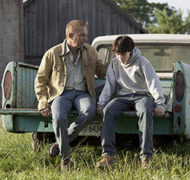Man of Steel: The Strength of Fathering
Blog / Produced by The High Calling
Editorial Note: We think it’s worth revealing a few plot points to consider the power of fatherhood, but please note that you will encounter some movie spoilers in this article.
“Whenever you find tears in your eyes, especially unexpected tears, it is well to pay the closest attention.”
~ Frederick Buechner, Beyond Worlds
My wife and two daughters treated me on Father’s Day to an afternoon showing of Man of Steel, the newest cinematic version of the Superman story. As summertime superhero movies go it was okay; not stellar, just okay. Interestingly enough, when I left the theater, I was not inspired to be like Superman—but rather to be like Superman’s father, the earthly version played by Kevin Costner. In my opinion, Jonathan Kent stole the show, and he did it without blue tights or a cape. He did it by being a good father.
In many ways, we earthly fathers feel a lot like Jonathan Kent. We’re handed this baby that came from somewhere other than us, and we’re expected to help raise him or her. The child is a mystery at best, with powers that both amaze and frighten us. We realize this little person is somewhat like us, but also very different. But what Jonathan Kent displayed in that movie were the sacrifices necessary to raise a child; they’ll take everything you’ve got and then some. And that’s the deal.
One scene progression in particular drew tears from my eyes. A grown Clark and his parents are driving down the highway, and he’s arguing with his father, blowing the kind of steam that young men often do at their dads. While his mother, Martha, tries to calm Clark down, Jonathan lets his son say what he has to say. The father shows a steeliness that is not threatened by his son’s emotions but rather provides space for them. While you get the impression that Martha thinks her son is being disrespectful, Jonathan knows Clark is stretching his wings, pressing against the boundaries he’s known up to that point, a behavior that all sons and daughters must do if they’re to someday fly. The message, in my opinion, was clear: I love you, son, and my love covers anything you might say or think or do or feel. That’s the deal.
In the next few moments of the film, the action presses in, and we witness Jonathan Clark literally give his life for his son. He sacrifices himself so that his son might live to become who he was born to be. That’s what good fathers do; that’s what good fathers have always done. We sacrifice ourselves to provide for our children not just food and clothing and shelter, although those are important. We also do what we can to provide what John Updike called “luxurious hopes”—you can fly farther than me, you can do more than I’ve done, you are destined for grand things, and I’ll do anything to help you believe that, no matter the cost.
If you dig around the Latin root of the word sacrifice, you find “to make holy or sacred.” When we fathers sacrifice for our sons and daughters, we are bringing a sacredness into a world that is far too often unsacred, if not desecrated. But that kind of fathering is not for the faint of heart. It requires you not to be tough as nails, but to be a man of steel—and those are two very different things. Pursue the former, and you’ll probably end up a nail. Practice the latter, and chances are good you’ll watch your son or daughter take his or her place in the sun, and fly.
That’s the deal. And I wouldn’t trade it for the world.
Image sourced from Warner Bros. Post by John Blase, author of Know When to Hold 'Em: The High Stakes Game of Fatherhood.





